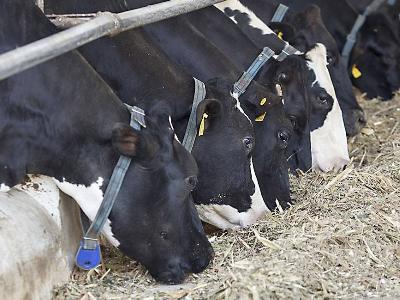Total mixed ration system for dairy cows: benefits, drawbacks
The many benefits of total mixed ration are weighed against their disadvantages for farmers to decide whether such feeding system is for them to adopt.
 How feed efficient is your dairy cow?
How feed efficient is your dairy cow? Dairy farmers in the Netherlands can find out the feed efficiency of the offspring of sires values that are included in the breeding value and could contribute
 EU dairy industry milk crisis impacting feed production
EU dairy industry milk crisis impacting feed production Compound feed producers feel pain of dairy surpluses since the end of EU milk quota system.
 How animal feed enzymes can improve producer profitability
How animal feed enzymes can improve producer profitability The specific roles of phytases, carbohydrases and protease result in numerous benefits for animals and producers.
 Benefits of fiber-degrading enzymes in dairy cow diets
Benefits of fiber-degrading enzymes in dairy cow diets The addition of enzymatic feed additives to dairy cow diets increase feed intake, animal performance. Enzymes can improve feed efficiency and reduce the cost of
 Diseases of Cattle: COCCIDIOSIS
Diseases of Cattle: COCCIDIOSIS Coccidiosis continues to be one of the major disease problems for cattle producers. It is caused by microscopic, one-celled parasites.
 Diseases of Cattle: CANCER EYE
Diseases of Cattle: CANCER EYE Bovine ocular neoplasia includes a variety of benign and malignant skin tumors of the eyeball and eyelids. They can cause local problems with eye function
 Diseases of Cattle: CALF SCOURS
Diseases of Cattle: CALF SCOURS Calf scours or calf diarrhea causes more financial loss to cow-calf producers than any other disease-related problem they encounter
 Diseases of Cattle: BVD - Bovine Virus Diarrhea
Diseases of Cattle: BVD - Bovine Virus Diarrhea Bovine Virus Diarrhea infection can cause numerous problems, such as damage to the digestive and immune systems, pneumonia, abortions, calf deformities
 Diseases of Cattle: BSE or Mad Cow Disease
Diseases of Cattle: BSE or Mad Cow Disease Bovine Spongioform Encephalopathy (BSE) is a progressive degenerative disease that affects to central nervous system of cattle.
 Diseases of Cattle: BRUCELLOSIS
Diseases of Cattle: BRUCELLOSIS Brucellosis of cattle is caused by infection with the bacterium Brucella abortus, which can also cause a disease of humans known as "undulant fever"
Bloat is a form of severe indigestion marked by a collection of gas in the rumen that the animal is unable to expel.Most of the gases are eliminated by belching
 Diseases of Cattle: BLACKLEG
Diseases of Cattle: BLACKLEG Blackleg is a highly fatal disease of young cattle caused by the spore forming, rod shaped, gas producing bacteria Clostridium chauvoei.
 Diseases of Cattle: ANTHRAX
Diseases of Cattle: ANTHRAX Anthrax, a highly infectious and fatal disease of mammals and humans, is caused by a relatively large spore-forming rectangular shaped bacterium called Bacillus
 Diseases of Cattle: ANAPLASMOSIS
Diseases of Cattle: ANAPLASMOSIS Anaplasmosis is a vector-borne, infectious blood disease in cattle caused by the rickesttsial parasites Anaplasma marginale and Anaplasma centrale.
 Make lameness control a priority this winter
Make lameness control a priority this winter As farmers prepare to house their cows for the winter months, now is the perfect time to review lameness protocols to incorporate the latest research findings
 How to formulate better ruminant diets
How to formulate better ruminant diets Understanding that soluble protein does not equal degraded protein is essential for maximizing the positive effects of formulations.
 How to prevent milk fever in dairy cows
How to prevent milk fever in dairy cows Prevention strategies include manipulation of the cow’s close-up diet post-calving. Hypocalcaemia, or milk fever, is a common occurrence in dairy operations
 How much salt should you add in your animal feed diets?
How much salt should you add in your animal feed diets? Because salt is cheap we tend to forget how much we add in animal feeds, but it is not always right to overdo it.
 5 milk fever prevention strategies for dairy cows
5 milk fever prevention strategies for dairy cows Hypocalcaemia, or milk fever, can be prevented with carefully monitored dietary strategies. Milk fever is a common occurrence in dairy operations
